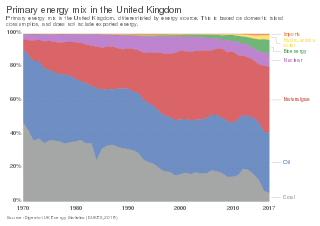Related Research Articles

Water conservation includes all the policies, strategies and activities to sustainably manage the natural resource of fresh water, to protect the hydrosphere, and to meet the current and future human demand. Population, household size and growth and affluence all affect how much water is used. Factors such as climate change have increased pressures on natural water resources especially in manufacturing and agricultural irrigation. Many countries have already implemented policies aimed at water conservation, with much success. The key activities to conserve water are as follows: any beneficial reduction in water loss, use and waste of resources, avoiding any damage to water quality; and improving water management practices that reduce the use or enhance the beneficial use of water. Technology solutions exist for households, commercial and agricultural applications. Water conservation programs involved in social solutions are typically initiated at the local level, by either municipal water utilities or regional governments. Common strategies include public outreach campaigns, tiered water rates, or restrictions on outdoor water use such as lawn watering and car washing.

Energy conservation is the effort made to reduce the consumption of energy by using less of an energy service. This can be achieved either by using energy more efficiently or by reducing the amount of service used. Energy conservation is a part of the concept of Eco-sufficiency. Energy conservation measures (ECMs) in buildings reduce the need for energy services and can result in increased environmental quality, national security, personal financial security and higher savings. It is at the top of the sustainable energy hierarchy. It also lowers energy costs by preventing future resource depletion.
The United Kingdom's Climate Change Programme was launched in November 2000 by the British government in response to its commitment agreed at the 1992 United Nations Conference on Environment and Development (UNCED). The 2000 programme was updated in March 2006 following a review launched in September 2004.

The Carbon Trust was developed and launched during first Blair Administration (1997-2001) as part of the development of the Climate Change Levy (CCL), a tax on business energy use that still operates today. The original intention was that the Carbon Trust would be funded by around £50m pa of tax revenue generated from the Levy to help businesses reduce energy costs and therefore offset the additional cost of paying the CCL. The establishment of the Carbon Trust was announced in the 2000 White Paper "Climate Change - the UK Programme". It was launched alongside the introduction of the CCL in April 2001.
Domestic housing in the United Kingdom presents a possible opportunity for achieving the 20% overall cut in UK carbon dioxide emissions targeted by the Government for 2010. However, the process of achieving that drop is proving problematic given the very wide range of age and condition of the UK housing stock.
Various energy conservation measures are taken in the United Kingdom.

The current energy policy of the United Kingdom is the responsibility of the Department for Business, Energy and Industrial Strategy (BEIS), after the Department of Energy and Climate Change was merged with the Department for Business, Innovation and Skills in 2016. Energy markets are also regulated by the Office of Gas and Electricity Markets (Ofgem).

The Climate Change and Sustainable Energy Act 2006 is an Act of the Parliament of the United Kingdom which aims to boost the number of heat and electricity microgeneration installations in the United Kingdom, so helping to cut carbon emissions and reduce fuel poverty.
Public water supply and sanitation in the United Kingdom is characterised by universal access and generally good service quality. A salient feature of the sector in the United Kingdom compared to other developed countries is the diversity of institutional arrangements between the constituting parts of the UK, which are each described in separate articles, while this article is devoted to some common issues across the United Kingdom.
Energy Saving Trust (EST) is a British organization devoted to promoting energy efficiency, energy conservation, and the sustainable use of energy, thereby reducing carbon dioxide emissions and helping to prevent man-made climate change. It was founded in the United Kingdom as a government-sponsored initiative in 1992, following the global Earth Summit.

Water efficiency is reducing water wastage by measuring the amount of water required for a particular purpose and the amount of water used or delivered. Water efficiency differs from water conservation in that it focuses on reducing waste, not restricting use. Solutions for water efficiency focus not only on reducing the amount of potable water used, but also on reducing the use of non-potable water where appropriate. It also emphasises the influence consumers can have in water efficiency by making small behavioural changes to reduce water wastage and by choosing more water efficient products.

Solar Cities is an innovative A$97 million demonstration programme designed to promote solar power, smart meters, energy conservation and new approaches to electricity pricing to provide a sustainable energy future in urban locations throughout Australia. Adelaide, Alice Springs, Blacktown, Central Victoria and Townsville were nominated to be the first Solar Cities of Australia, in the 2007 election campaign the Labor government committed to expanding the programme to include Coburg and Perth. Solar Cities is an innovative program that aims to show how technology, behavior change, and new approaches to energy pricing can combine to provide a sustainable energy future in urban locations throughout Australia".
The National Energy Foundation (NEF) is an independent British charity, established to improve the use of energy in buildings.
Public water supply and sanitation in Denmark is characterized by universal access and generally good service quality. Some salient features of the sector in the Denmark compared to other developed countries are:
Public water supply and sanitation in Scotland is characterised by universal access and generally good service quality. Water and sewerage services are provided by a single public company, Scottish Water. The economic water industry regulator is the Water Industry Commission for Scotland. It "promotes the interests of water and sewerage customers in Scotland by making sure that householders and businesses receive a high-quality service and value for money by setting prices, monitoring Scottish Water's performance and facilitating competition in the water industry". The environmental regulator is the Scottish Environment Protection Agency. Drinking water standards and wastewater discharge standards are determined by the EU.
Public water supply and sanitation in England and Wales has been characterised by universal access and generally good service quality. Salient features of the sector in the United Kingdom compared to other developed countries is the full privatisation of service provision and the pioneering of independent economic regulation in the sector in Europe. There has been a substantial increase in real tariffs between 1989 and 2005, whilst independent assessments place the cost of water provision in the UK as higher than most major countries in the EU. The government body responsible for water regulation, together with the water companies, have claimed improvements in service quality during the same period.
National Mission for Enhanced Energy Efficiency (NMEEE) is one of the eight missions under the National Action Plan for Climate Change. taken by the Indian government to promote the market for energy efficiency by fostering innovative policies and effective market instruments. Its roots lie in the overall objective of The Energy Conservation Act of 2001. The mission document, which was approved in 2010, established the immense energy efficiency potential of India, which was about Rs. 74,000 crores. The Mission, upon its complete execution, envisages to achieve total avoided capacity addition of 19,598 MW, fuel savings of around 23 million tonnes per year and green house gas emissions reductions of 98.55 million tonnes per year. A recent World Bank study has estimated the country's energy efficiency market to be at 1.6 lakh crores.

The Bumblebee Conservation Trust is an organisation in the UK that makes efforts to monitor and conserve bumblebees and their habitat.

Peoples Trust for Endangered Species (PTES) is a charitable organisation registered in England and Wales. It exists to promote the conservation of rare or declining species and habitats in the UK and worldwide through monitoring, public engagement, education, and through the funding of conservation projects and research. It also owns and manages two nature reserves. As of April 2015, PTES has 16 employees, five trustees and coordinates around 24,000 volunteers in the UK. PTES relies on donations from the general public and grants from trusts and foundations to continue its work - it receives no core funding from the UK Government. The organisation has registered charity number 274206.

Dr. Hariharan Chandrashekar is an Indian ecological economist, mentor for green entrepreneurship, and enabler of industry directions on sustainability and resilience, particularly for buildings, and the built environment.
References
- ↑ Walter Menzies, Chief Executive, Mersey Basin Campaign
- ↑ WaterUK report to Select Committee of Parliament Archived 2006-05-16 at the Wayback Machine
- ↑ Water UK
- ↑ House of Commons, Early Day Motion, Water Efficiency, 26 October 2005
- ↑ Water Saving Group, Department of Environment, Food, and Rural Affairs Archived 2006-02-13 at the Wayback Machine
- ↑ Water Efficiency Journal
- ↑ Marketing Week, 'Water Marque' scheme aims to aid product marketing
- ↑ A report to Defra Reviewing International Models of External Water Use Restrictions, as one example of Waterwise's policy work Archived 2003-04-22 at the Wayback Machine
- ↑ Using Water Wisely: How to Change Consumer Behaviour, University of Oxford
- ↑ Saving Water in Scotland network draw up action plan to guard against future water shortages, waterbriefing.org
- ↑ Water/B&Q Water Efficiency Campaign, an example of teaming up with business
- ↑ DirectGov Greener Living Archived 2007-04-22 at the Wayback Machine
- ↑ The Crikey Water Diet, based on Waterwise research on embedded water Archived 2007-09-26 at the Wayback Machine
- ↑ The Blueprint for Water